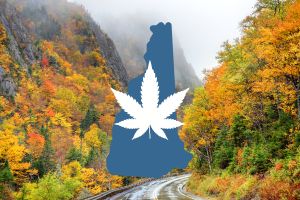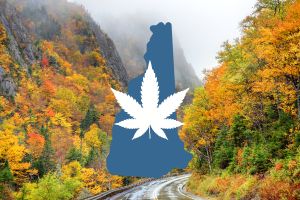Is Hemp Legal in New Hampshire?
Posted by Tweedle Farms on Jul 28th 2022

In New Hampshire, the conversation around hemp and its derivatives continues to evolve, reflecting broader national trends towards legalization and normalization. Among these, CBD flower stands out due to its unique, wide-open legal status and varied range of applications. In this article, we’re going to explore the legality of CBD flower and hemp products in the state of New Hampshire, hopefully offering insights for consumers, growers, and enthusiasts alike.
Understanding Hemp
Hemp, and it’s main by-product, CBD flower, is a variety of the Cannabis sativa plant, legally distinguished by its low THC content (THC, of course, being the psychoactive compound prevalent in THC-rich cannabis, colloquially known as marijuana). Under federal law, hemp is defined as having 0.3% THC or less on a dry weight basis, i.e. post-decarboxylation. This distinction is crucial in understanding the legal framework surrounding CBD flower, hemp and hemp’s many derivatives, including refined CBD and chemically-converted THCA.
Hemp Legislation in New Hampshire
In alignment with the 2018 Farm Bill, which federally legalized the cultivation of CBD flower and removed hemp from the Controlled Substances Act, New Hampshire has developed its own set of regulations governing the cultivation, processing, and sale of CBD flower and hemp products. These state laws are designed to ensure that hemp products produced and sold in New Hampshire meet federal standards for THC content.
Hemp Flower in New Hampshire
CBD flower, the bud from the hemp plant, is legal in New Hampshire, provided it complies with state and federal THC limits. The market for CBD flower in the state caters to a variety of uses, including therapeutic and industrial applications. State regulations mandate rigorous testing and labeling to ensure consumer safety and product integrity.
THCA Flower: Legal Considerations in New Hampshire
THCA, or tetrahydrocannabinolic acid, is a non-psychoactive precursor to THC found in raw and unprocessed hemp. THCA can convert to THC when exposed to heat (a process known as decarboxylation), and as a result, THCA flower is illegal in state of New Hampshire. That’s because the total THC content goes above 0.3% THC, post-decarboxylation. This distinction is critical for consumers and law enforcement to understand, to navigate the legal landscape effectively.
Compliance and Enforcement
New Hampshire's Department of Agriculture, Markets, and Food oversees the cultivation and processing of CBD flower and hemp products, issuing licenses and conducting inspections to ensure compliance with state and federal laws. Growers and processors must adhere to strict guidelines regarding THC content, record-keeping, and product labeling to maintain their licenses and avoid penalties.
Consumer Safety and Legal Access
For consumers in New Hampshire, accessing hemp products and CBD flower legally and safely requires diligence. Purchasing from licensed and reputable sources ensures product quality and legal compliance. State regulations also emphasize the importance of third-party testing and clear labeling to inform consumers about product contents and safety.
The Future of Hemp Law in New Hampshire
As the hemp industry continues to grow, legal and regulatory frameworks in New Hampshire may evolve to address emerging challenges and opportunities. Advocacy and industry development play crucial roles in shaping future legislation, with a focus on balancing consumer safety, market growth, and agricultural innovation.
Conclusion
The legality of hemp flower in New Hampshire reflects a complex interplay of federal and state laws, consumer safety concerns, and industry regulations. Understanding the legal status of CBD flower and hemp products is essential for consumers, growers, and industry stakeholders. As laws and regulations continue to evolve, staying informed and engaged with the legal landscape will be key to navigating the world of hemp in New Hampshire responsibly and effectively.



